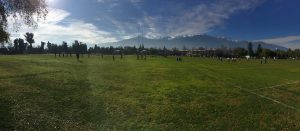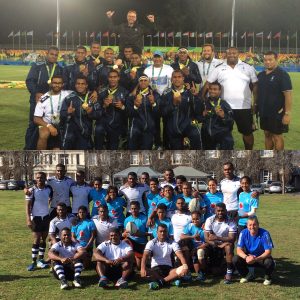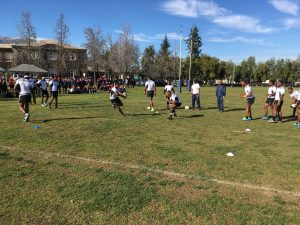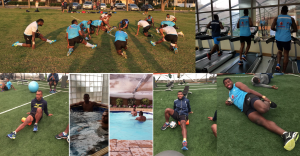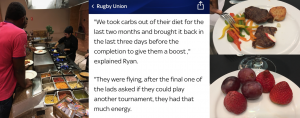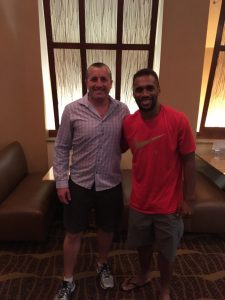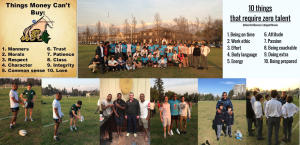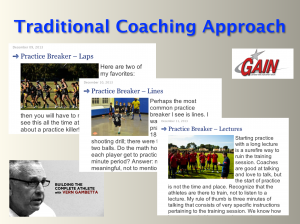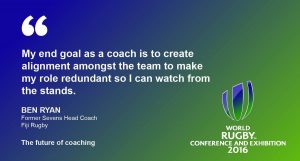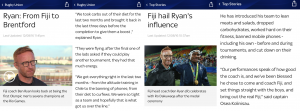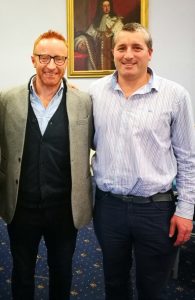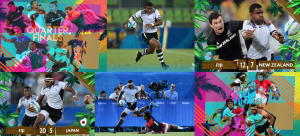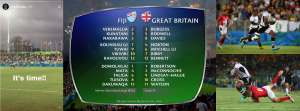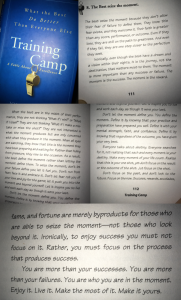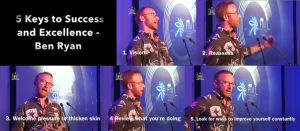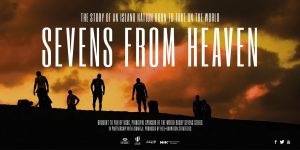To experience this first hand for 2 weeks, to speak with Ben, Chris, Rob and Naca 1-on-1, to get to know Osea, to watch their every training session, to listen to how Ben coached the team, to see how they trained, to be invited into the inner sanctum of the team during their Lotu: It was something money can not buy. The experience was PRICELESS and it taught me several things and also reaffirmed I am on the right coaching philosophy pathway…
It was an HONOUR and a PRIVILEGE to play a small part in the preparations for the first ever Olympic Gold medallists in Rugby 7s. Thank you very much to Ben, Rob and the team for allowing me to become part of the team for a very short period time. It is an experience I will never forget.
I first came across Ben personally when I attended a 7s Coaching Conference at Oxford University, hosted by Independent Coach Education, in 2008 when Ben was England 7s Head Coach and I was the Director of Rugby at Denstone College. This experience had a major influence on the way I would view and coach the 7s game and how my teams would subsequently play the game, e.g. using the Touchline Press in defence. Ben clarified many things that day that would have a profound impact on me as a 7s coach.
During some time in 2015 I sent an email to Ben to sow a seed of the idea of the Fiji 7s team coming to Chile prior to heading to the 2016 Olympic Games in Rio as I was based in Santiago as Director of Rugby at The Grange School. Then at the beginning March 2016 I received a message from Ben saying he was thinking of coming with the team to Santiago as a holding camp pre Rio and he asked if I thought it might work. I said to leave it with me as I would need to speak with various contacts I know to see if I could make this possible for Ben and the team.
A few phone calls, messages, emails and conversations later I had secured all the necessary arrangements for the Fiji 7s teams, Men’s and Women’s, to come to Santiago for 2 weeks prior to them heading over the Andres to Rio de Janeiro for the 2016 Summer Olympic Games. This included visiting the Marriott 5* Hotel next to the Parque Arauco Shopping Mall to check out all the facilities Ben was requesting for the use of the team, booking the bus company for all the trips to and from the hotel to the training grounds and airport, confirming that they could use the Speedworks facilities for their Strength & Conditioning work and the use of the school playing fields for all their training sessions.
Due to the schedule of the 7s matches at the Olympics, it meant the Women’s 7s squad arrived a few days before the Men’s 7s squad. The Women’s 7s team was coached by Chris Cracknell, former England 7s player under Ben Ryan. On arrival they were straight into the hotel’s gym going through some recovery work and stretching to get over the couple of days travelling from Fiji.
Observing Chris coach the side, he used a variety of methods… from Conditioned Games, to Purposeful and Deliberate practices, to Unit skills i.e. scrums and lineouts, and Questioning. Above all else he made everything fun and enjoyable creating an environment the ladies were relaxed in, which meant they could do their best and perform each day.
Once the Men’s team had arrived, one thing I observed that was very clever, was the integration of coaching the Women’s and Men’s teams together to nurture the sense of belonging and togetherness. This involved work around the breakdown, including tackling and clearing/protecting the ball. It gave a great opportunity for the Women’s team to learn from the Men’s team and for the Men’s players to coach the Women’s players to improve their understanding.
What did I learn…?
Warm-up Routine
Regardless of the planned session ahead, Ben and the players would basically go through the same routine to prepare for their training. It would be the same warm-up that they would do in the 5m area behind the deadline ball line when playing at Tournaments in stadiums on the World Series circuit.
It would first involve movement with communication and different skills…
Purposeful/Deliberate Practice: “Rondo”
The key to Purposeful and Deliberate Practices is that you work out what is going to give you the biggest bang for your buck. A process I use to do this is to analyse the ‘Demands of the Game’, the skills players do during a game, plus working out the key principles as to ‘Why tries are scored and conceded in a match?’ If you do this process with 7s, you’ll identify that Offloading is a major part of the game and is a Game Changer. This is backed up by the 80/20 rule of Pareto’s Law that Ben highlighted to us when he shared his journey and experiences of winning the gold medal.
The key question to ask yourself as a coach is: “Does what I do with the players in training transfer to what they do in matches…?”
If your answer to this question is a “no” then you need to take a good look at what you are doing and work out what you do need to do in the future to ensure transfer from the training/coaching you do to the matches your players play…
For the rugby spectator in the stadium, or the fan on their sofa watching their TV, they believe that the Fijian way is from another universe, that they are born to do the skills they display and that no one else can do the things that they do.
The secrets of Fiji’s ‘mystical’ rugby…
Amazing Sevens skills from Fiji…
Seven sizzling tries in Paris…
Having witnessed the Fiji 7s train for 2 weeks, it is very clear the reason why they display such amazing skills…
They practise offloading every training session and the key method Ben used was the Purposeful and Deliberate Practice called the “Rondo” which is made famous by Pep Guardiola in Soccer when he was coaching at Barcelona and Ben has translated it into what it is for Rugby. Ben would slide the physicality of the Rondo along the contact continuum from 2 handed touch all along to full-on contact, from 2v1 to 3v2 to 5v3 depending on the outcome he was wishing for based on the Tactical Periodisation planning and the integration of offloading during Conditioned Games with the Purposeful and Deliberate practices.
Conditioned Games/Games for Understanding
Ben’s main Method of Coaching was using Conditioned Games/Games for Understanding. Some people say that the best way to train for 7s is to plays 7s and I am a firm believer in this concept.
A significant aspect I witnessed was when Ben gave the ownership of the Conditioned Games over to the players. Osea, the Captain, would become the Coach for that particular time during training. At times they slowed it down to walking pace which was very intriguing to observe and makes very good sense.
Recovery
They would use a whole variety of modalities for Recovery depending on what training/travel had been done prior to their recovery session.
One thing that I did notice at the end of every training session was that the players would do a cool down on the field, with the key focus being static stretches.
Through my relationship with Edmundo Olfos, the Head Coach of Chile 7s, he had connections within the Chilean Olympic organisation and he provided a couple of masseurs each evening to provide massages for the players who wanted them.
Ben wrote a Blog article on “recover, reset and run, run, run.” just before the Hamilton 7s leg in New Zealand of the 2018 World Series. You can read it here… http://benryan.co.uk/recover-reset-run/
Nutrition
This is a key factor in peaking to perform at the highest level in the competitive arena and Ben was very strict with the players’ nutrition when in camp or during competitions. The press picked up on this and if you look at numerous articles with Ben, he would talk about nutrition and everything that was said/written was true. Ben would look over the shoulders as the players went along the line filling up their plates at dinner time when I was invited to join them. If he saw a player with too much rice he would tell the player to put some back and have more of something else.
Ben would term a certain player’s look as a rice belly where you wouldn’t see a “6 pack” on his stomach. This would be because a player would eat too much rice, i.e. carbohydrates, which is a staple part of their diets when growing up on the islands. If unused CHOs turn to fat, with fat just being dead weight when running around a rugby field. Having the lowest possible Body Fat % means a player has a higher Power:Weight ratio meaning that they will, e.g. accelerate faster on the field thus being more dynamic and harder to be tackled. Ben would also stop the players ingesting caffeine, then the night of a tournament he would give the players dark chocolate as a treat. This would have many benefits but more so with the psychology of the players feeling good about themselves in the fact that they had eaten some chocolate and it became a ritual.
Osea Kolinisau
From the moment I was first introduced to Osea to the moment he got on the bus for the last time to head to the airport, he was the perfect leader, role model and captain. He was such a great guy, so humble and so generous of his time. He would quite happily answer my questions to gain an understanding of what it is like to train for and play at the highest level in the most famous 7s team.
He was a major factor in why Fiji 7s won the gold medal. He was the key link for Ben to get the vibe of the players and to find out what the players were thinking and feeling. At times during the training sessions Ben would hand over the coaching to Osea and he would be the one questioning the players, giving advice, providing feedback and giving instructions. He would also use the time of their Lotu’s to give/reinforce key messages to the players.
While attending Vern Gambetta’s GAIN XI in June 2018 at Rice University, Houston, Texas I reached out to Osea as he is now playing for the Houston Sabercats in the recently created MLR professional rugby union league in the USA.
We again discussed many of the factors that played key parts in achieving their ultimate gold of winning. He was so humble in sharing his knowledge and experiences.
Lotu
Faith plays a huge part in the culture of Fijians, and the 7s team is no different. Every morning and every evening the players would meet in one of the players’ room. I was very honoured to be invited to two Lotu’s in the evening during their time in Santiago. Here are some of the things I was able to experience: One of the team reads a Bible passage and then translates it to a message that applies to the team and their situation, a player says a prayer for the group and they end their time together singing a hymn.
At the end of the 2 weeks they said THANK YOU through singing a hymn in the foyer area of the hotel just before they got on the bus to head to the airport…
To see, live and experience the culture of one of the most iconic sporting teams in the world, the Fiji 7s team, who are the equivalent of the New Zealand All Blacks in the XV-a-side version of the game, and to get an understanding of what it takes to prepare to perform at the highest level in the arguably the world’s largest and biggest sporting extravaganza where everyone is aiming to peak to win a gold medal was an amazing unforgettable experience.
What were my takeaway messages…?
Their humility…
As I left the hotel on their last evening in Santiago, I walked through the Parque Arauco Mall complex and popped into Starbucks to order a Latte to walk home with. While placing my order one of the players had walked in behind me. I was about to pay for my coffee, but the player insisted that he paid for it. I insisted he didn’t but he persisted. I said thank you very much, you’re very kind.
Routines…
At the end of training sessions players who do “extras”… i.e. working on their skills.
Deliberate Practice…
Conditioned Games…
No Laps… No Lines… No Lectures…
Player-centred Coaching…
The Art of Man Management with Ben Ryan and Pat Lam…
You do not need all the ‘Bells & Whistles’ to prepare for and perform at the highest level in the most pressurised of cauldrons… that being the Olympic Gold medal Final match with the hopes of a nation resting on your shoulders waiting for you to bring the Gold medal home… against the biggest and wealthiest rugby nation, i.e. the England RFU who were under the guise of Great Britain.
Then I was very fortunate back in November 2017 to attend another Conference, hosted by Independent Coach Education at Bisham Abbey, when Ben shared his experiences with Fiji 7s… Chaotic Simplicity: Lessons from Fiji 7s with Ben Ryan.
When you look at the most successful rugby teams, the New Zealand All Blacks, the Super Rugby Crusaders and the Fiji 7s teams, they share many things in common that enable them to be as successful as they are over a sustained period of time. Behind these teams are some of the best coaches in the world. These coaches share their experiences…
I have been very fortunate to learn from these coaches first hand. Back in 2012, Wayne Smith shared how he had just won the 2012 Super Rugby competition with the Chiefs (they went on to win the 2013 competition as well) and how he finds the Try Scoring Trends. In 2009 I spent 3 weeks with the Crusaders, who are the most successful Super Rugby Franchise, and was able to speak with their coaches about anything down in the cafe next to the training ground. Ben is no different and I am very fortunate to be able to seek advice from him as well.
Ben taking a day out of his very hectic world post gold medal in Rio to share his experiences is one of these many things. He shared with us what it took to perform and win at the highest level, under the most intense of pressures, with the weight of Everest on the players’ shoulders to bring home the gold medal to their adoring fans who’s ‘religion’ is Rugby 7s, and with the expectation that they are the favourites to win the gold medal.
Here are some of my key takeaway messages from the day with Ben…
Psychological Safety
- Belonging
- Purpose
- Status/Valued
- Security
- Achievement/Acknowledgement
- Free/Autonomous
“Plan your work and then work your plan” i.e. have a Season Plan
Have a plan so you know where you are going… i.e. PLANNING
Pareto’s Law: 80/20 rule
Roughly 80% of the effects come from 20% of the causes
Principles of Play:-
No breakdown (takes the referee out of making the wrong decision)
Work in 3s, both in Attack and Defence
Tempo, i.e. have a change of pace
“Fishing”: A player runs across sideways to see if a defender jumps out of the line
Offloading (The best one is the one that is very late off the floor)
Cuts on the ends (End, Late, Early, Deep) = Changes defender from – to / (i.e. turns their hips)
“The standard you walk past is the standard that you become…”
GREY kills you! You need discipline standards… Black and White.
Airplanes… don’t do things that will crash the aeroplane!
Rondo
Matches at the Olympic Games…
They got off to a nervous start against Brazil who raised their game to new heights to see the half-time score at 7-5 but the difference in class told in the end with Fiji running out comfortable winners 40-12.
Here’s a clear example of the transfer of training that the Purposeful and Deliberate Practice of the Rondo has to score the winning try against Argentina…
Slow Motion Offload…
Fiji met Great Britain in the Olympic Gold medal match, which saw Ben come up against many of the England players that he brought into the England 7s team many years ago.
Fiji were simply on the another planet in the final and proved that possession of the ball is critical to winning matches. 43-7
Ben told the story of when he went out to the warm-up pitch prior to the Gold medal match… As he walked through the tunnel, due to the draw he was expecting to be at one of the ends, but England had already set up all their cones ready for their warm-up (at the “wrong” end). Ben could have made a fuss about this but he didn’t. He left it and just wandered to the other end. He was then left waiting and wondered where his players were…?! It turns out they were singing and dancing in the changing rooms for their pre-match warm-up. You couldn’t have a more contrast in preparations for the most important and pressurised match of their lives… The all singing and all dancing warm-up of England with all their cones and regimented routine of x and y for 2 minutes 22 seconds and 37 seconds respectively etc., right down to the last second before leaving the changing rooms to go to the tunnel to walk on the pitch, compared to Fiji who were literally singing & dancing and simply enjoying each other’s company and savouring the moment together as team because it would be the last time that they would all be together in the inner sanctum of their changing rooms.
There’s definitely a lesson here to take away about what you need to do to perform at the highest level…
Ben shared his Vision…
This can be viewed here…
Ben has written a book and it can be ordered here from Amazon…
They released a short feature film which can be viewed here…
Jerry Tuwai documentary…
Fiji Rugby Sevens Best Tries | Top 10…
https://www.youtube.com/watch?v=4EE4vo3P6kk
Flying Fijian MAGIC tries in Dubai…
Fiji’s golden fairytale: Rugby’s greatest story?…


